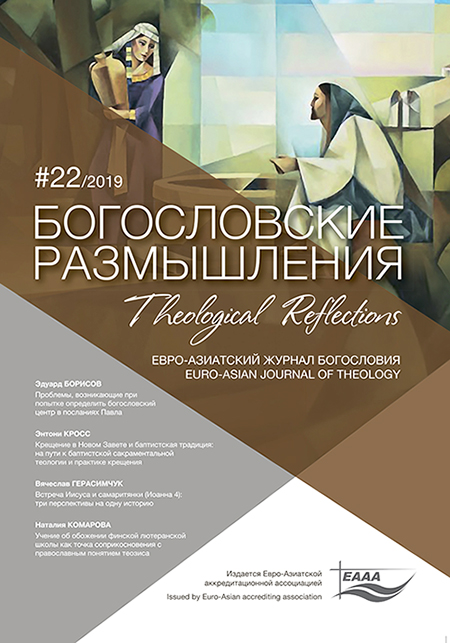Baptism, the New Testament, and the Baptist Tradition: Towards a Baptist Sacramental Theology and Practice of Baptism
DOI:
https://doi.org/10.29357/2521-179X.2019.22.2Keywords:
baptism, faith, conversion, Holy Spirit, sacrament, synecdocheAbstract
In the New Testament baptism is an integral part of becoming a Christian and part of the proclaimed gospel. Yet many Baptists fail to see this, understanding it merely as a sign of a salvation already secured. However, this article argues that the “one baptism” of Ephesians 4.5 is faith-baptism/missionbaptism, conversion-baptism/initiation, and that the baptism referred to in the New Testament refers to this one baptism of Spirit and water. In this article he outlines the case for this, contending that in key passages “baptism” is an example of synecdoche, a form of metaphor in which a part of something is used to refer to the whole – in this case, baptism for the whole process of becoming a Christian (cf. 1 Peter 3.21). He then argues the case for a sacramental interpretation of baptism – that it is more than a symbol – from a thorough-going Baptist and Evangelical perspective. The author concludes with reflections on the necessity of baptismal reform and the relevance of a return to conversion-baptism for the contemporary church in a post-Christian, post-Christendom, mission setting.References
- Без библиографии
Downloads
How to Cite
Issue
Section
License
Copyright (c) 2020 Anthony R. CROSS

This work is licensed under a Creative Commons Attribution-NonCommercial 4.0 International License.
All articles published in the Journal are distributed under a Creative Commons Attribution-NonCommercial 4.0 International License
By submitting an article for publication in Theological Reflections: Eastern European Journal of Theology the author grants the editors the right to publish the article and distribute it in electronic and print form.
The author reserves all copyrights and the right to use the materials of the article in whole or in part for educational purposes, to write his own dissertations, to prepare abstracts, conference reports, oral presentations, etc., as well as post electronic copies of articles (including the final electronic version downloaded from the journal’s official website) on non-commercial web-resources without the consent of the editorial board and founders.



